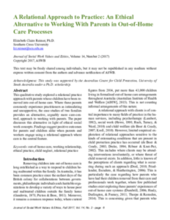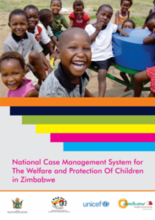Displaying 351 - 360 of 477
This article provides a discussion of the theoretical basis underpinning safety and risk assessment in child protection, and further describes the empirical research process involved in the development of safety and risk assessment tools and training materials for social workers in the South African child protection field.
This package is a compilation of resources and new evidence for case management and supervision of humanitarian workers in responding to child protection situations.
This qualitative study explored a relational practice approach with parents whose children have been removed into out-of-home care in Australia.
This manual is intended to train Para-social workers who are a non-formal “workforce” that constitute the largest but yet undefined group of caregivers who provide support and services to vulnerable children and families, particularly in low and middle income countries (GSSA, 2016).
The purpose of this document is to provide a framework for implementation of the National Case Management System (NCMS) for the care, protection and welfare of children in Zimbabwe.
This video from the National Child Welfare Workforce Institute explains how the state of Missouri in the US reformed its child welfare system by strengthening the social service workforce.
The European Recommendations on the implementation of a child rights-based approach for care professionals working with and for children highlights the steps to be undertaken to develop a child care service workforce capable of applying a child rights-based approach to their work.
A summary of the International Alternative Care Conference 2016 via Storify.
This self-assessment and planning tool is intended for nonprofits and schools working with families to provide services that more effectively reach and engage parents in fostering their children's development.
The purpose of this paper is to map the current organisation and implementation of children’s services in three regions of Spain, to identify strengths and gaps and to suggest proposals for improvement in line with European recommendations.







